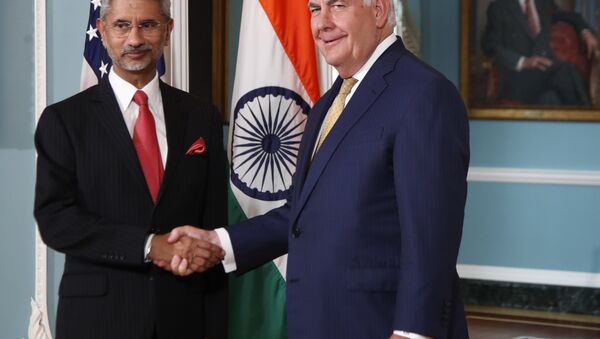President Xi Jinping's speech at the Chinese Communist Party Congress may have been seen as provocative as he highlighted the success of the Chinese government and outlined China's aim for greater influence abroad.
Sputnik spoke to Sumit Ganguly, Professor of Political Science at the University of Indiana, and Professor Dibyesh Anand, Head of the Department of Politics and International Relations at the University of Westminster.
Sputnik: What have India-US relations been like historically?
Prof. Sumit Ganguly: Historically, during the Cold War the countries were mostly at odds and it's only at that end of the cold war that relations fitfully improved. But again they were set back considerably because of the US obsession with non-proliferation and the India nuclear tests in 1998.
Many in the Indian foreign policy and security establishment are unsure if they want to align themselves with the United States to contain China; on the other hand the Indians recognize that China does pose a significant threat to Indian interests, not just along the Himalayan border, but in South Asia and Asia in general.
The previous regime had gone out of its way to try and accommodate China and discovered to its dismay, in its last days that these attempts at accommodation and appeasement did not get them very far.
Sputnik: Does China pose a threat to stability in India and Asia as a whole at present?
Prof. Dibyesh Anand: The way that Indian and Chinese security policy functions, is that they both see each other as challenges. Both of them have disputed borders, so that's a source of conflict, and India also perceives China to be a hegemony that wants to have relations with other South Asian countries, so India does see China as a challenge.
There is a division in India where some people see China as a potential ally, but most would see them as an enemy.
Sputnik: In what aspects could a US-India alliance benefit India, if at all?
Prof. Dibyesh Anand: The way hawkish US-India experts in India see the US-India alliance, is as something that is welcome because that could strengthen India vis-a-vis China.
I am quite skeptical about this, because India and China are neighbors, whether we like it or not. The US comes and goes, and when you look at US policy towards its own allies, Pakistan is a good example — they are seen as an enemy of India, but were an ally of the US, using them for its own benefit and only supported them to suit its own interests.
Therefore, the risk for India in terms of close alliance with the US, is that it will become trapped into the Cold War type of mentality vis-a-vis China, without benefiting much from it.
Specifically, when we look at the kind of regime the US has now with Trump… it is quite uncertain. Why should India align itself with the US, when India should be keeping equidistance from the US, Russia, China and all of the great powers?
India is actually in a very good position right now to be genuinely nonaligned.


